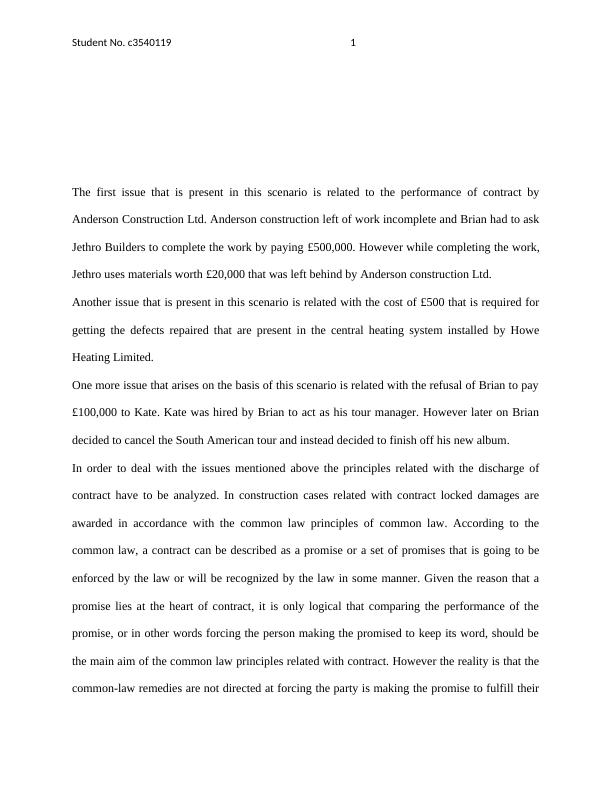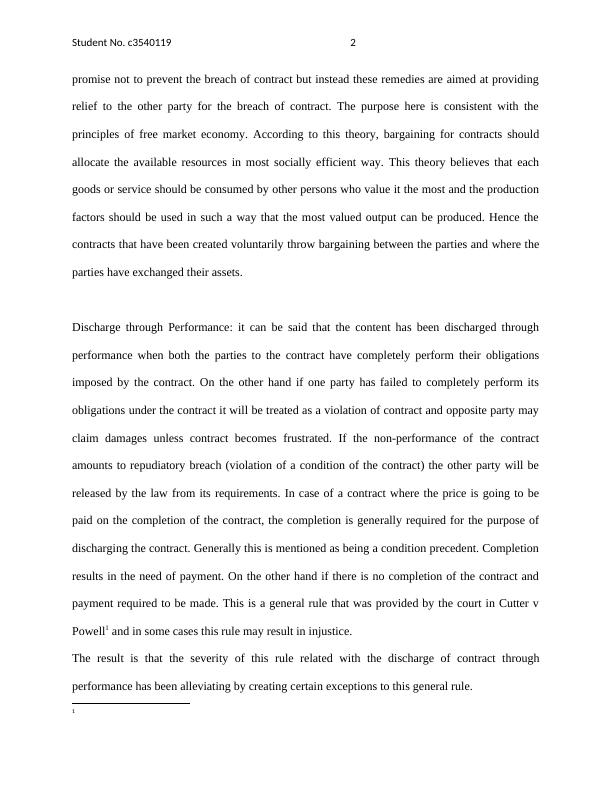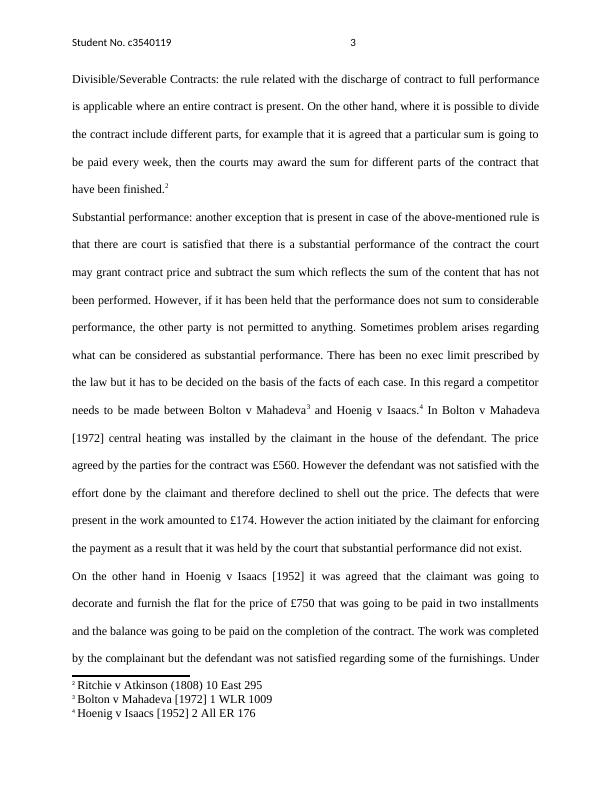Discharge of Contract through Performance: Analysis of Principles
Added on 2023-04-22
7 Pages2226 Words473 Views
Student No. c3540119 1
The first issue that is present in this scenario is related to the performance of contract by
Anderson Construction Ltd. Anderson construction left of work incomplete and Brian had to ask
Jethro Builders to complete the work by paying £500,000. However while completing the work,
Jethro uses materials worth £20,000 that was left behind by Anderson construction Ltd.
Another issue that is present in this scenario is related with the cost of £500 that is required for
getting the defects repaired that are present in the central heating system installed by Howe
Heating Limited.
One more issue that arises on the basis of this scenario is related with the refusal of Brian to pay
£100,000 to Kate. Kate was hired by Brian to act as his tour manager. However later on Brian
decided to cancel the South American tour and instead decided to finish off his new album.
In order to deal with the issues mentioned above the principles related with the discharge of
contract have to be analyzed. In construction cases related with contract locked damages are
awarded in accordance with the common law principles of common law. According to the
common law, a contract can be described as a promise or a set of promises that is going to be
enforced by the law or will be recognized by the law in some manner. Given the reason that a
promise lies at the heart of contract, it is only logical that comparing the performance of the
promise, or in other words forcing the person making the promised to keep its word, should be
the main aim of the common law principles related with contract. However the reality is that the
common-law remedies are not directed at forcing the party is making the promise to fulfill their
The first issue that is present in this scenario is related to the performance of contract by
Anderson Construction Ltd. Anderson construction left of work incomplete and Brian had to ask
Jethro Builders to complete the work by paying £500,000. However while completing the work,
Jethro uses materials worth £20,000 that was left behind by Anderson construction Ltd.
Another issue that is present in this scenario is related with the cost of £500 that is required for
getting the defects repaired that are present in the central heating system installed by Howe
Heating Limited.
One more issue that arises on the basis of this scenario is related with the refusal of Brian to pay
£100,000 to Kate. Kate was hired by Brian to act as his tour manager. However later on Brian
decided to cancel the South American tour and instead decided to finish off his new album.
In order to deal with the issues mentioned above the principles related with the discharge of
contract have to be analyzed. In construction cases related with contract locked damages are
awarded in accordance with the common law principles of common law. According to the
common law, a contract can be described as a promise or a set of promises that is going to be
enforced by the law or will be recognized by the law in some manner. Given the reason that a
promise lies at the heart of contract, it is only logical that comparing the performance of the
promise, or in other words forcing the person making the promised to keep its word, should be
the main aim of the common law principles related with contract. However the reality is that the
common-law remedies are not directed at forcing the party is making the promise to fulfill their

Student No. c3540119 2
promise not to prevent the breach of contract but instead these remedies are aimed at providing
relief to the other party for the breach of contract. The purpose here is consistent with the
principles of free market economy. According to this theory, bargaining for contracts should
allocate the available resources in most socially efficient way. This theory believes that each
goods or service should be consumed by other persons who value it the most and the production
factors should be used in such a way that the most valued output can be produced. Hence the
contracts that have been created voluntarily throw bargaining between the parties and where the
parties have exchanged their assets.
Discharge through Performance: it can be said that the content has been discharged through
performance when both the parties to the contract have completely perform their obligations
imposed by the contract. On the other hand if one party has failed to completely perform its
obligations under the contract it will be treated as a violation of contract and opposite party may
claim damages unless contract becomes frustrated. If the non-performance of the contract
amounts to repudiatory breach (violation of a condition of the contract) the other party will be
released by the law from its requirements. In case of a contract where the price is going to be
paid on the completion of the contract, the completion is generally required for the purpose of
discharging the contract. Generally this is mentioned as being a condition precedent. Completion
results in the need of payment. On the other hand if there is no completion of the contract and
payment required to be made. This is a general rule that was provided by the court in Cutter v
Powell1 and in some cases this rule may result in injustice.
The result is that the severity of this rule related with the discharge of contract through
performance has been alleviating by creating certain exceptions to this general rule.
1
promise not to prevent the breach of contract but instead these remedies are aimed at providing
relief to the other party for the breach of contract. The purpose here is consistent with the
principles of free market economy. According to this theory, bargaining for contracts should
allocate the available resources in most socially efficient way. This theory believes that each
goods or service should be consumed by other persons who value it the most and the production
factors should be used in such a way that the most valued output can be produced. Hence the
contracts that have been created voluntarily throw bargaining between the parties and where the
parties have exchanged their assets.
Discharge through Performance: it can be said that the content has been discharged through
performance when both the parties to the contract have completely perform their obligations
imposed by the contract. On the other hand if one party has failed to completely perform its
obligations under the contract it will be treated as a violation of contract and opposite party may
claim damages unless contract becomes frustrated. If the non-performance of the contract
amounts to repudiatory breach (violation of a condition of the contract) the other party will be
released by the law from its requirements. In case of a contract where the price is going to be
paid on the completion of the contract, the completion is generally required for the purpose of
discharging the contract. Generally this is mentioned as being a condition precedent. Completion
results in the need of payment. On the other hand if there is no completion of the contract and
payment required to be made. This is a general rule that was provided by the court in Cutter v
Powell1 and in some cases this rule may result in injustice.
The result is that the severity of this rule related with the discharge of contract through
performance has been alleviating by creating certain exceptions to this general rule.
1

Student No. c3540119 3
Divisible/Severable Contracts: the rule related with the discharge of contract to full performance
is applicable where an entire contract is present. On the other hand, where it is possible to divide
the contract include different parts, for example that it is agreed that a particular sum is going to
be paid every week, then the courts may award the sum for different parts of the contract that
have been finished.2
Substantial performance: another exception that is present in case of the above-mentioned rule is
that there are court is satisfied that there is a substantial performance of the contract the court
may grant contract price and subtract the sum which reflects the sum of the content that has not
been performed. However, if it has been held that the performance does not sum to considerable
performance, the other party is not permitted to anything. Sometimes problem arises regarding
what can be considered as substantial performance. There has been no exec limit prescribed by
the law but it has to be decided on the basis of the facts of each case. In this regard a competitor
needs to be made between Bolton v Mahadeva3 and Hoenig v Isaacs.4 In Bolton v Mahadeva
[1972] central heating was installed by the claimant in the house of the defendant. The price
agreed by the parties for the contract was £560. However the defendant was not satisfied with the
effort done by the claimant and therefore declined to shell out the price. The defects that were
present in the work amounted to £174. However the action initiated by the claimant for enforcing
the payment as a result that it was held by the court that substantial performance did not exist.
On the other hand in Hoenig v Isaacs [1952] it was agreed that the claimant was going to
decorate and furnish the flat for the price of £750 that was going to be paid in two installments
and the balance was going to be paid on the completion of the contract. The work was completed
by the complainant but the defendant was not satisfied regarding some of the furnishings. Under
2 Ritchie v Atkinson (1808) 10 East 295
3 Bolton v Mahadeva [1972] 1 WLR 1009
4 Hoenig v Isaacs [1952] 2 All ER 176
Divisible/Severable Contracts: the rule related with the discharge of contract to full performance
is applicable where an entire contract is present. On the other hand, where it is possible to divide
the contract include different parts, for example that it is agreed that a particular sum is going to
be paid every week, then the courts may award the sum for different parts of the contract that
have been finished.2
Substantial performance: another exception that is present in case of the above-mentioned rule is
that there are court is satisfied that there is a substantial performance of the contract the court
may grant contract price and subtract the sum which reflects the sum of the content that has not
been performed. However, if it has been held that the performance does not sum to considerable
performance, the other party is not permitted to anything. Sometimes problem arises regarding
what can be considered as substantial performance. There has been no exec limit prescribed by
the law but it has to be decided on the basis of the facts of each case. In this regard a competitor
needs to be made between Bolton v Mahadeva3 and Hoenig v Isaacs.4 In Bolton v Mahadeva
[1972] central heating was installed by the claimant in the house of the defendant. The price
agreed by the parties for the contract was £560. However the defendant was not satisfied with the
effort done by the claimant and therefore declined to shell out the price. The defects that were
present in the work amounted to £174. However the action initiated by the claimant for enforcing
the payment as a result that it was held by the court that substantial performance did not exist.
On the other hand in Hoenig v Isaacs [1952] it was agreed that the claimant was going to
decorate and furnish the flat for the price of £750 that was going to be paid in two installments
and the balance was going to be paid on the completion of the contract. The work was completed
by the complainant but the defendant was not satisfied regarding some of the furnishings. Under
2 Ritchie v Atkinson (1808) 10 East 295
3 Bolton v Mahadeva [1972] 1 WLR 1009
4 Hoenig v Isaacs [1952] 2 All ER 176

End of preview
Want to access all the pages? Upload your documents or become a member.
Related Documents
Discharge of Contract: Principles and Exceptionslg...
|7
|2169
|490
Civil Engineering & Surveying - Assignmentlg...
|11
|3873
|119
Breach of Contractlg...
|8
|2374
|140
Business and Corporation Lawlg...
|8
|1938
|230
Master's Degree in Accounting - Statslg...
|11
|2244
|298
Business and Corporations Lawlg...
|11
|3752
|149
